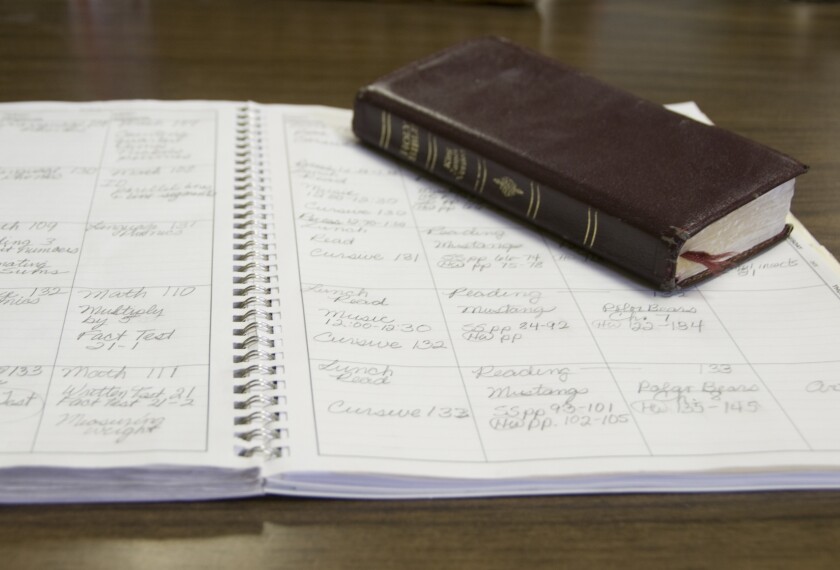Oklahoma Superintendent Ryan Walters issued guidance on teaching about the Bible in public schools July 24, a month after he first ordered educators in the state to teach about the religious text.
The guidance calls on schools to provide every classroom with a physical copy of the Bible, the U.S. Constitution, and the Declaration of Independence, calling the documents “mandatory for the holistic education of students in Oklahoma.” It directs teachers of 5th through 12th grade students to incorporate teachings about the Bible’s “influence on Western civilization,” “impact on American history,” and use in art and culture.
“The Bible must be used in student instruction for its historical, literary and secular value and is not to be used for religious purposes such as preaching, proselytizing, or indoctrination,” the guidance says, touching on a common criticism of Walters’ order by Bible scholars and historians.
Groups including the American Academy of Religion and the American Historical Association have both condemned Walters’ directive, saying in statements that it “shrinks rather than expands religious literacy” by presenting a narrow view of the role of Christianity in the nation’s founding. Others have criticized Walters for singling out the Bible without mentioning other religious texts and for assembling a committee to review Oklahoma’s social studies standards that includes evangelical activist David Barton, who rejects the notion that the U.S. Constitution protects religious pluralism.
Supporters of including the Bible in curriculum say it helps provide crucial background knowledge that can boost students’ literacy skills and ability to navigate conversations about art and history.
Some Oklahoma educators have indicated they won’t follow the law and Oklahoma standards, so let me be clear: they will comply, and I will use every means to make sure of it."
The document lists classroom activities and discussion points, citing related state learning standards. In 5th grade, for example, students should “identify and discuss simple literary devices such as similes, metaphors, and personification within biblical texts,” the guidance said. In middle school comparative-literature units, students should “compare biblical stories with myths and legends from other cultures, examining similarities and differences.” High school teachers should “facilitate discussions on the ethical and philosophical ideas presented in the Bible and their influence on Western thought,” it said.
While the new guidance does a good job identifying places the Bible may fit into the broader curriculum, it does not provide enough specific, practical direction for teachers about how to respect and acknowledge a variety of religious and nonreligious perspectives in the classroom, said Mark A. Chancey, a professor of religious studies at Southern Methodist University who studies Bible courses in public schools. Without such guidance, “instruction often reflects strong religious bias, even among well-prepared and well-intentioned teachers,” he said.
“What is a teacher supposed to say when a child asks if the world was created in seven days, or whether Moses parted the Red Sea, or if Jesus actually rose from the dead?” Chancey said in an email to Education Week. “Teachers need help navigating such issues.”
Scholars also disagree about the influence of the Bible in the country’s founding documents, Chancey said, noting that the Declaration of Independence does not quote or allude to the religious text.
Oklahoma district leaders resist Bible directive
The new directions come as a growing number of Oklahoma district leaders say their school systems will not comply with the Bible-teaching directive, citing concerns about respecting students from a variety of faith and nonreligious backgrounds, concerns about legal action from families who disagree with the way the lessons may be carried out, and questions about Walters’ legal authority to impose such requirements.
“Some Oklahoma educators have indicated they won’t follow the law and Oklahoma standards, so let me be clear: they will comply, and I will use every means to make sure of it,” Walters said in a news release.
The guidance doesn’t specify penalties for educators who don’t comply or legal justification for such consequences. An Oklahoma law firm with a history of challenging Walters’ directives has argued that the Bible mandate is invalid and an infringement on local control.
The guidance also doesn’t specify what translation of the Bible schools should use. That decision can be tricky because perspectives differ on which translations are the most reliable, how much authority individuals have to interpret and apply them, and which books should be included.
Discussions of religion should be included in social studies classes to help students understand concepts like bridging differences, the National Council for the Social Studies said in a July 22 message. But those discussions should include a variety of religions, and they should respect the diverse identities of students, said the organization, which represents social studies teachers around the country.
“About 3 in 10 Americans identify as religiously unaffiliated, according to a 2023 Pew Research study,” the position statement said. “While a majority of Americans describe themselves as religious, about 28 percent do not identify with a religion. Our students need to see themselves in what we teach.”
While the new Oklahoma guidance touches on some legal considerations, it still focuses on one religious text, and it does not specify what professional development teachers should receive to handle the sensitive questions that arise in discussions of religion, NCSS Executive Director Lawrence M. Paska said in an interview.
While Oklahoma’s social studies standards do mention the role of religion, “singling out one document to achieve that standard is still not creating an equal space for teaching about religion or creating room for all belief systems,” Paska said.







